Building an e-commerce website can be challenging. The right website builder makes the process easier.
Choosing between the top e-commerce website builders can be daunting. Each platform offers unique features, pricing, and benefits. Understanding these differences can help you make an informed decision. We will compare the best e-commerce website builders. You will learn which one suits your needs.
Whether you are starting a small business or expanding an existing one, this comparison will guide you. Stay tuned to discover which platform can help you build a successful online store.
Introduction To E-commerce Website Builders
In today’s digital age, setting up an online store is more important than ever. Whether you’re selling handmade crafts, digital products, or a wide range of items, having a solid e-commerce website is crucial. But where do you start? That’s where e-commerce website builders come into play. These platforms are designed to help you create a professional-looking online store with ease, even if you’re not a tech guru.
Importance Of Choosing The Right Builder
Why does it matter which e-commerce website builder you choose? Well, it’s a bit like picking the right tool for the job. Imagine trying to cook a gourmet meal with a plastic knife – frustrating, right? The right builder will give you the features and flexibility you need to create a successful online store. It can save you time, money, and a lot of headaches down the road. Plus, a good builder will help you provide a better shopping experience for your customers, which can lead to more sales and a thriving business.
Key Features To Consider
When choosing an e-commerce website builder, there are several key features to consider:
- Ease of Use: Is the platform user-friendly? Can you easily navigate and set up your store without needing a degree in computer science?
- Customization: Does the builder offer enough customization options to make your store stand out?
- Payment Options: Can you integrate various payment methods to cater to a wide audience?
- Mobile Responsiveness: In a mobile-first world, does your website look good on smartphones and tablets?
- SEO Features: Does the builder help you optimize your store for search engines?
Choosing the right e-commerce website builder is a big decision. But with the right information and a clear understanding of your needs, you can find the perfect platform to help your business grow. Ready to dive deeper? Let’s explore the top e-commerce website builders and see which one suits you best.

Credit: www.ecommerce-nation.com
Shopify
Shopify is a leading e-commerce platform. It helps businesses create online stores. Over one million businesses trust Shopify. They use it to sell products worldwide. Shopify is known for its user-friendly interface. Many find it easy to set up and manage.
Overview Of Features
Shopify offers a range of features. It provides customizable templates. These templates help create professional-looking stores. Users can choose from various themes. Shopify supports multiple payment gateways. This includes PayPal and Stripe. It also has built-in SEO tools. These tools help improve search engine rankings. Shopify’s inventory system is robust. It allows easy management of products. Users can also track orders efficiently.
Pros And Cons
Shopify has many advantages. It is easy to use. Beginners can set up stores quickly. It offers 24/7 customer support. This helps resolve issues anytime. Shopify has a large app store. Users can add extra features easily. It also supports multiple languages. This helps reach a global audience.
Yet, there are some downsides. Shopify can be expensive. Monthly fees add up. Transaction fees apply unless using Shopify Payments. Customization options can be limited. Advanced users might feel restricted. Also, exporting data can be challenging. Users may need third-party apps.
Wix
When it comes to building an e-commerce website, one name that often pops up is Wix. Known for its user-friendly interface and customization options, Wix has become a go-to choice for many aspiring online entrepreneurs. But what makes Wix stand out in the crowded market of e-commerce website builders? Let’s dive in and find out.
Overview Of Features
Wix offers a plethora of features designed to make your e-commerce journey as smooth as possible. Here are some of the highlights:
- Drag-and-Drop Builder: No coding skills? No problem! Wix’s drag-and-drop builder allows you to create a professional-looking site with ease.
- Customizable Templates: Choose from a variety of templates tailored to different industries. Each template is fully customizable, allowing you to add your personal touch.
- App Market: Enhance your site with apps from the Wix App Market. From marketing tools to customer service apps, you’ll find everything you need.
- Mobile Optimization: Your site will look great on any device, thanks to Wix’s mobile optimization feature.
- SEO Tools: Get found on Google with Wix’s built-in SEO tools. Customize meta tags, URLs, and more to improve your site’s search engine ranking.
- Secure Payments: Wix supports multiple payment methods, including credit cards and PayPal, ensuring secure transactions.
Pros And Cons
Like any platform, Wix has its strengths and weaknesses. Here’s a breakdown to help you decide if it’s the right fit for you:
| Pros | Cons |
|---|---|
|
|
In summary, Wix offers a user-friendly and comprehensive solution for those looking to build an e-commerce site. While it has its limitations, the ease of use and variety of features make it a strong contender in the e-commerce website builder arena. So, is Wix the right choice for you? Only you can decide, but it’s definitely worth considering as you embark on your online business journey.
Squarespace
When it comes to building an online store, Squarespace is a name that frequently pops up. Known for its sleek designs and user-friendly interface, Squarespace is a solid choice for many e-commerce entrepreneurs. Let’s delve into what makes Squarespace stand out, and weigh its pros and cons.
Overview Of Features
Squarespace offers a range of features that cater to both beginners and seasoned website builders. Here’s a quick rundown:
- Beautiful Templates: Squarespace is renowned for its visually appealing and professionally designed templates. These templates are fully customizable, allowing you to create a unique look for your store.
- Drag-and-Drop Builder: Even if you have no coding experience, Squarespace’s drag-and-drop builder makes it easy to design your site. You can simply move elements around to fit your vision.
- Mobile Optimization: Every template on Squarespace is optimized for mobile devices, ensuring your site looks great on any screen size.
- Integrated E-commerce Tools: Squarespace includes essential e-commerce tools such as product management, inventory tracking, and payment processing. You can also sell physical products, digital goods, and services.
- SEO Features: Built-in SEO tools help you optimize your site for search engines. This includes customizable meta tags, clean URLs, and more.
- 24/7 Customer Support: Got a problem? Squarespace offers round-the-clock customer support through live chat and email.
Pros And Cons
Like any platform, Squarespace has its strengths and weaknesses. Here’s a balanced look:
| Pros | Cons |
|---|---|
|
|
In conclusion, Squarespace is an excellent choice for those who prioritize aesthetics and ease of use. It’s perfect for small to medium-sized businesses and entrepreneurs who want a hassle-free way to get their online store up and running. However, if you need extensive customization or third-party app integrations, you might find it somewhat limiting. But hey, for most folks, it hits the sweet spot between functionality and style!
Bigcommerce
BigCommerce stands out as a robust e-commerce platform. It’s designed for businesses of all sizes. With its powerful features, it can handle large product catalogs and high traffic. Let’s explore what makes BigCommerce a great choice for online stores.
Overview Of Features
BigCommerce offers a range of features to support your online business. It includes built-in SEO tools. These help improve your site’s visibility on search engines. The platform also supports multi-channel selling. Sell on Amazon, eBay, and social media from one place.
The platform has a variety of themes. These are fully customizable to match your brand. BigCommerce also provides advanced analytics. Track your store’s performance and make data-driven decisions.
Another key feature is its secure checkout process. Protect your customers’ data with top-notch security measures. Plus, there are no transaction fees. Keep more of your hard-earned money.
Pros And Cons
BigCommerce has many advantages. It’s easy to use. Even beginners can set up their store quickly. The platform is scalable. It grows with your business, handling increased traffic and sales.
BigCommerce offers excellent customer support. Get help through live chat, email, or phone. The platform also integrates with many apps. Add extra functionality to your store with ease.
But, there are some downsides. BigCommerce’s pricing can be high. This may be a concern for small businesses. The themes, while customizable, can be limiting. You may need a developer for advanced changes.
Overall, BigCommerce is a strong choice for an e-commerce platform. Its features and support make it a solid option for many online businesses.

Credit: www.kovaion.com
Woocommerce
WooCommerce is a popular e-commerce plugin for WordPress. It allows users to turn their WordPress site into a fully functional online store. With WooCommerce, users can sell products, manage orders, and handle payments. It is highly customizable and integrates seamlessly with WordPress themes. This makes it a preferred choice for many small to medium-sized businesses.
Overview Of Features
WooCommerce offers a wide range of features. It supports both physical and digital products. Users can add unlimited products and categories. The platform also allows for product variations and multiple images per product. Inventory management is built in. Users can track stock levels, manage backorders, and get notifications. WooCommerce supports various payment gateways including PayPal, Stripe, and bank transfers. It also offers shipping options with real-time rates and shipping labels. Additionally, WooCommerce has extensive support for taxes and localization.
Pros And Cons
There are several advantages to using WooCommerce. First, it is free and open-source. This means there are no upfront costs. Second, it is highly customizable. Users can choose from thousands of themes and plugins. Third, it integrates seamlessly with WordPress. This makes it easy to use for WordPress users. Fourth, it supports a wide range of payment gateways and shipping options. However, WooCommerce has some drawbacks. It can be complex to set up for beginners. The costs of premium themes and plugins can add up. Additionally, support is community-driven, which may not be ideal for everyone.
Comparative Analysis
When it comes to choosing the right e-commerce website builder, the options can be overwhelming. With so many choices, how do you decide which one is best for your online store? In this comparative analysis, we’ll break down the top e-commerce website builders, focusing on key aspects like ease of use, customization options, and pricing. Let’s dive in!
Ease Of Use
For many users, especially beginners, the ease of use is a critical factor. You want a platform that’s intuitive and doesn’t require a degree in computer science to operate. Here’s a look at how some top contenders stack up:
- Shopify: Known for its user-friendly interface, Shopify allows you to set up your store in minutes. With drag-and-drop features, it’s as simple as pie.
- Wix: Wix offers an easy-to-use platform with a flexible editor. Even if you’re not tech-savvy, you’ll find it straightforward.
- BigCommerce: While slightly more complex, BigCommerce provides an extensive knowledge base to help you along the way.
Customization Options
Customization is crucial if you want your store to stand out. The ability to tweak every little detail can make a significant difference. Here’s how our top picks compare:
| Platform | Customization Level |
|---|---|
| Shopify | High – With numerous themes and a robust app store, you can customize almost anything. |
| Wix | Medium – Plenty of templates and an easy editor, but slightly less flexible than Shopify. |
| BigCommerce | High – Offers comprehensive customization options, especially if you have coding skills. |
Pricing
Of course, pricing is always a significant consideration. You need to balance your budget with the features you need. Here’s a breakdown of the pricing for these platforms:
- Shopify: Plans start at $29/month. There are also higher tiers with more features.
- Wix: Pricing starts at $23/month for the Business Basic plan.
- BigCommerce: Starting at $29.95/month, it’s slightly more expensive but includes many features right out of the box.
Ultimately, the best e-commerce website builder for you will depend on your specific needs and preferences. Are you looking for simplicity, customization, or the best bang for your buck? Each platform has its strengths, so take the time to consider what matters most for your online store.

Credit: www.singlegrain.com
Choosing The Right Builder For Your Needs
Choosing the right e-commerce website builder can feel like finding a needle in a haystack. There are so many options out there, and each claims to be the best. But don’t worry, we’re here to help you navigate through this jungle of choices. By considering key factors like your business size, type, and budget, you can narrow down the options and find the perfect fit for your needs.
Business Size And Type
The size and type of your business play a huge role in determining the best e-commerce builder for you. Are you a small boutique selling handmade crafts, or a large retailer with thousands of products? Let’s break it down:
- Small Businesses: For small businesses or startups, simplicity and ease of use are key. Look for builders with intuitive interfaces and plenty of templates to choose from, like Shopify or Wix. These platforms allow you to get up and running quickly without needing a degree in web design.
- Medium Businesses: If you’re scaling up, you’ll need more advanced features. Platforms like BigCommerce offer powerful tools for managing inventory, SEO, and even marketing.
- Large Enterprises: For large businesses, customization and scalability are crucial. Magento or Salesforce Commerce Cloud might be your best bet. These platforms offer robust functionalities and can handle high traffic and large inventories.
Budget Considerations
Your budget will also heavily influence your choice of an e-commerce website builder. Here’s a simple breakdown:
| Budget Range | Recommended Builders |
|---|---|
| Low Budget ($0 – $50/month) | Wix, Weebly |
| Mid Budget ($50 – $200/month) | Shopify, BigCommerce |
| High Budget ($200+/month) | Magento, Salesforce Commerce Cloud |
Remember, more expensive doesn’t always mean better for your specific needs. Sometimes, a lower-cost builder with the right features can be the perfect match. So, weigh your options carefully and consider what each builder offers in relation to your business goals.
In conclusion, choosing the right e-commerce website builder boils down to understanding your business size, type, and budget. By focusing on these factors, you’ll be better equipped to make an informed decision that will set your online store up for success.
Final Thoughts
Wrapping up our comparison of top e-commerce website builders, it’s essential to look back at the highlights. Picking the right platform can shape the success of your online store. Let’s break down the key points and share some recommendations.
Summary Of Key Points
We reviewed several popular e-commerce website builders. Each has its strengths and weaknesses. Shopify stands out for its ease of use and extensive app store. WooCommerce is perfect for those who love WordPress and need flexibility. BigCommerce offers robust features and scalability for growing businesses. Wix and Squarespace are ideal for small businesses with their simple design tools and beautiful templates.
Shopify shines in customer support and third-party integrations. WooCommerce offers endless customization with many plugins. BigCommerce excels in built-in features, reducing the need for extra apps. Wix and Squarespace provide stunning designs with user-friendly interfaces. Each platform offers unique benefits, catering to different business needs.
Recommendations
Choose Shopify if you need an all-in-one solution with excellent support. It is great for beginners and experienced users alike. For those who prefer WordPress, WooCommerce is a great choice. It provides flexibility and control over your store. BigCommerce is suitable for businesses planning to scale quickly. It has powerful tools and features for growth.
If you own a small business and want a beautiful, easy-to-build website, consider Wix or Squarespace. Both offer simple drag-and-drop builders and stylish templates. Evaluate your specific needs and budget. This will help you select the best e-commerce website builder for your business.
Frequently Asked Questions
Which Website Builder Is Best For E-commerce?
Shopify is the best website builder for e-commerce. It offers powerful tools, reliable performance, and excellent customer support.
Which E-commerce Website Is Best?
Amazon is often considered the best e-commerce website due to its vast selection, competitive pricing, and reliable service.
What Is The Most Successful Ecommerce Website?
The most successful eCommerce website is Amazon. It dominates the global online retail market with extensive product offerings and fast shipping.
What Is The Average Cost To Build An Ecommerce Website?
The average cost to build an eCommerce website ranges from $5,000 to $50,000. Costs depend on design, features, and customization.
Conclusion
Choosing the right e-commerce website builder is essential. Each platform has unique features. Consider your business needs carefully. Compare costs, ease of use, and customer support. Test different platforms to find the best fit. A well-chosen builder can boost your online store’s success.
Make an informed decision for your e-commerce journey. Happy building!

